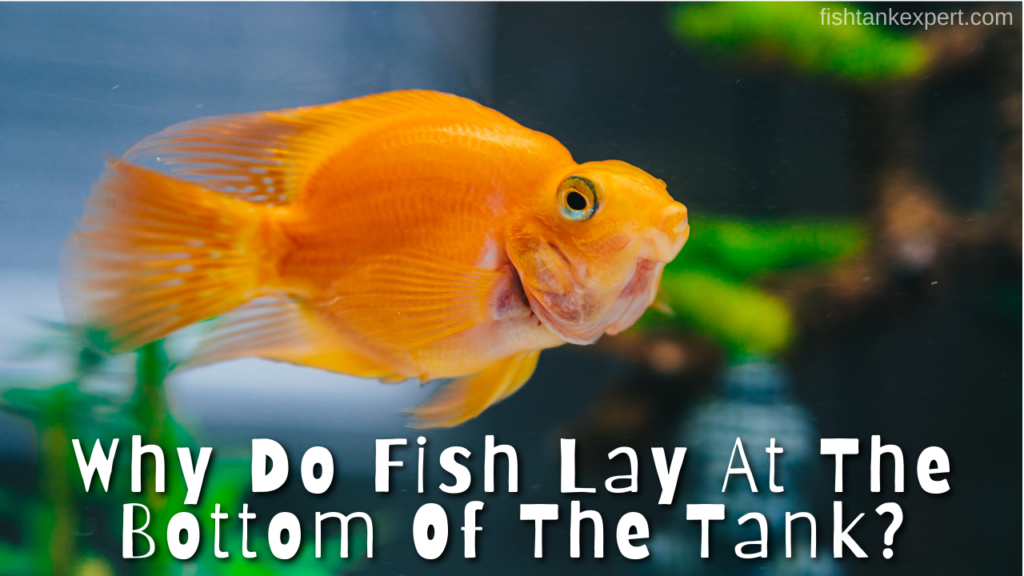As an aquarium owner, witnessing your favorite fish at the lowest level of the fish tank can be alarming. Weird thoughts come to your mind!
Why is my finned friend resting on the floor of the aquarium? Is it dealing with a health issue, or is it the water that needs to be replaced? Why is it not moving? Is the fish tank overcrowded? Is it suffocating?
Short answer – There is no need to panic!
Why do fish lay at the bottom of the tank?
There can be several causes of this strange fish behavior. Some fish settle down to take quick naps, while others might be scared of the big marine animals.
Water quality, oxygen level, stress, temperature, illness, loud noise, and a few other determinants can make the fish lazy and stay at the bottom of the tank.
Stress:
Fish prefer to stay at the bottom of the tank when stressed. Both internal and external stress can be a reason for sinking down the aquarium.
Tank to tank migration:
Changing homes can be stressful for aquatic animals, and fish are one of them. They do not readily adapt to new conditions, environment, light, or sounds around a new aquarium. Stress relief drops are available for minimizing the impacts of shifting from tank to tank.
Loud noises:
Aquarium water amplifies sound waves. Suppose your fish tank is near a noise-producing machine, like TV or speakers, the fish get scared of them. Placing the aquarium in a crowded place means welcoming more people to tap the glass and disturb the fish. The speed of sound in water is four times faster than sound that travels through the air.
Pets:
Cats and dogs often tend to notice the fish tank. Cats also dip paws in smaller tanks to catch prey. These things can stress out your fish, thus forcing them to stay at the bottom.
Lighting:
There are two types of fish; nocturnal and diurnal. They feel happy and relaxed in tanks with a balanced light. A combination of light and dark is necessary to avoid stress.
Temperature:
High temperature reduces the oxygen level of the aquarium, whereas low temperatures can make the fish lazy. Make sure that the temperature within the tank is balanced. If you have to make changes, make them slowly as fish are sensitive to temperature changes.
Non-cooperative fish:
A restless fish can disturb the living environment of other fish. These are aggressive in nature and usually keep on entering the territory of other fish. Such fish need to be shifted to a separate tank.
Sickness:
An ill fish will move slowly or remain static at the bottom of the tank. The most common fish sickness symptoms include spot appearance, heavy breathing, clamped fins, bloated appearance, or consistently stays isolated from the rest of the swimming partners. Specific medications and water drops are available to cope with such diseases.
Overcrowdedness:
There is a balance in every ecosystem. But if you enter more than the required quantity of fish in the same tank, the small-sized finned friends can hide or reside at the bottom of the tank. Overcrowding leads to difficulties in breathing, eating, swimming, and dirty tank water in a short span.
Sleep
With no eyelids, it isn’t easy to detect if a fish is napping. Fish can sleep in any part of the day, but most of them like to rest in the lower portion of the water tank. Some species show gradual movements of fins, mouth, or gills. However, if the environment is changed, the fish will stay inactive for long periods of time while they adjust.
Water parameters
A fish tank can develop a chemical imbalance very quickly. The imbalance of pH levels, ammonia, nitrate, and nitrites can result in an inactive fish. Water hardness is also an important factor. Other than the essential metals, oxygen levels should also be obtained. The little creatures need a balanced temperature, light, and oxygen to remain alive and kicking.
Conclusion
Knowing the real cause behind your fish laying in the bottom of the tank can be daunting. But taking appropriate measures can ease the stress levels. How did you recognize that your fish is sick? Or what was the reason behind your pet’s laziness? Let us know in the comments below!
